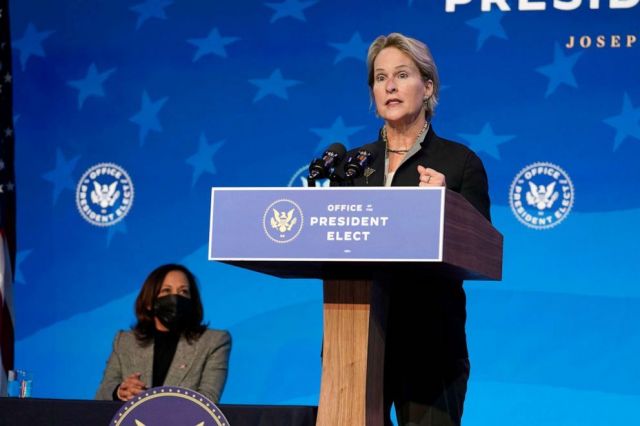President-Elect Joe Biden Names Nobel Laureate Frances Arnold to White House Science Team

Inspiring speech by newly-appointed Presidential Science Advisor Frances Arnold.
On January 16th, President-elect Joe Biden announced new members of his science team as well as his plan to elevate the director of the Office of Science and Technology Policy (OSTP) to a Cabinet-level position for the first time.
“Elevating this role to membership in the President’s Cabinet clearly signals the administration’s intent to involve scientific expertise in every policy discussion,” Sudip Parikh, chief executive officer of the American Association for the Advancement of Science, says in a statement.
As part of the new white house science team, ICB Caltech project leader since 2003, Frances Arnold will serve as co-chair of the President's Council of Advisors on Science and Technology (PCAST), along with Maria Zuber the E. A. Griswold Professor of Geophysics and vice president for research at MIT. They are the first women to serve as co-chairs of PCAST and will advise the president on matters involving science, technology, education, and innovation policy. The council also provides the president with scientific and technical information that is needed to inform public policy relating to the American economy, the American worker, national and homeland security as well as other topics.
Brad Chmelka, ICB co-director and professor of Chemical Engineering at UCSB said, "Our nation is fortunate to have acclaimed and inspiring scientists, like Professor Arnold, whose vision and guidance are sought to inform government policies. It is a testament to her values and citizenship that she has committed to this important new role as co-chair of PCAST, even as she continues her pioneering research in synthetic biology and educating young scientists for the future. At the ICB, we are very proud of her and her achievements."
“I could not be happier about serving at this time and for this President,” says Arnold, who has been working with Biden’s transition team to help identify scientists for roles in the administration. She says her main job now is to help choose PCAST’s additional members and to get to work setting a scientific agenda for the group. Climate change will clearly be one of PCAST’s most important efforts as science is at the heart of everything from mitigating the effects of climate change to moving to a carbon-free society, Arnold says.
Caltech’s Linus Pauling Professor of Chemical Engineering, Bioengineering and Biochemistry Arnold is the first American woman to receive the Nobel Prize in Chemistry (2018) and the recipient of numerous other honors including the 2011 National Medal of Technology and Innovation—from President Obama, the 2016 Millennium Technology Prize and was appointed to the Pontifical Academy of Sciences by Pope Francis in 2019. In addition, Arnold was the first woman to be elected to all three National Academies (of Science, Medicine, and Engineering).
Arnold is excited to play a part in the new administration. “We have to reestablish the importance of science in policymaking, in decision making across the government. We need to reestablish the trust of the American people in science,” Arnold says. “I think that PCAST can play a beneficial role in that.”
Reviving the damaged reputation of US science abroad and making sure international students want to study in the US is another important goal for Arnold. “The vibrancy of our science enterprise rests on our remarkable ability to pull in the best brains from all over the world,” she says. “Even if they go back to their own countries, we develop collaborations. Even better, some of those best brains stay here and contribute to our economy and to moving science forward.”
Investing in the US scientific workforce is also important, Arnold says. She especially wants to look at ways to support scientists from groups underrepresented in the sciences. “I’m personally dedicated to supporting women, people of color, and everybody who wants to do science,” she says. “We need all those good brains.”
Despite the assault on science during the last 4 years, research funding has held surprisingly steady during the Trump administration, Arnold says, because science has support from both sides of the political aisle. And science could always use more money.
Arnold wants to focus on fixing some of the damage that has been done to science over the last four years, when many government scientists quit. Arnold encourages young people to take those jobs. “We lost so many good people,” Arnold says. “I’d love to see really good people come back and work in national laboratories and government agencies, knowing that science will be treated with respect.”
Eric Lander is the nominee for the position of director of OSTP as well as co-chair of PCAST with Arnold and Zuber. Lander, who will require Senate confirmation, is a mathematician and geneticist who helped map the human genome and founded the Broad Institute, a biomedical research center known for their work on the gene-editing technology CRISPR-Cas9. Lander is also a biology professor at MIT and Harvard Medical School and previously served on President Barack Obama’s council of science advisers.
During Biden's announcement he said, “Science will always be at the forefront of my administration—and these world-renowned scientists will ensure everything we do is grounded in science, facts and the truth.” His science team will focus on five key areas: the coronavirus pandemic, the economy, the climate crisis, industry technology advancements and the long-term health of science and tech in the country.
In her acceptance remarks Arnold said, “I’m here today because of love. A love of science, yes, but also a deeper love, of our planet and of our people, without whom science has no purpose or meaning.” And that “our highest responsibility in each generation is to preserve our fragile planet, prepare our economy and our workforce for the future and pass on a better world.”
White house science team announcement—full video.
